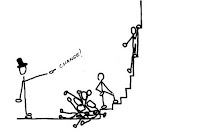Monday, December 1, 2008
Friday, November 21, 2008
A Small Reflection on Mental Model

Sitting by the sea, I was intimiated by different high waves at night. They were like the monsters who could swallowed me up to the darkeness. And I was scared. The waves rumbled and so did my heart.
My friend was bringing me to the meditative moments. I could feel the wind, wave and the air and realized that how lovely they were. And slowly I came to realize that "the intimidating waves are there a part of nature and they works by their own nature even though we might try to work hard to change their motions. The key stays deeply in my mind/ thoughts. As I had sensed fears about it, then it would be come fearful. Instead, I could accept as a part of the nature.
This has really opened up something. Many times, we've blocked ourselves with fears that stops us from seeing things by its reality. Instead, from the moments, I could learn to observe things and free myself from the fears! And probably because of this attachment, one has worked hard to change the things. In the other hands, the mental frame may cause different cause-effect lines by itself either virtually/ viciously.
As my friend said, the wave did not eat me up without my "imagination".
This is something about the work of mental model that I would like to share with you.
Thanks to my friend for the meditative moments!!!
Thursday, April 24, 2008
Taking Off the "Voice of Judgment" For a Fresh Learning
 Recently, I have run two theater sessions focused on Team trust building to a group of students. Normally, I prefer during the debriefs opening a free flow of discussion on what sorts of learning that attendants could gain are. There are some reasons for doing this.
Recently, I have run two theater sessions focused on Team trust building to a group of students. Normally, I prefer during the debriefs opening a free flow of discussion on what sorts of learning that attendants could gain are. There are some reasons for doing this. Monday, March 31, 2008
What would come out as I may say "I don't know"

One thing that I notice about myself and also others is the defensive effort in the conversations. There should be something “uncomfortable/ wrong” if I would say “I don’t know about it”. Rather, we try look around to advocate that “I know it and that I may not be wrong”.
One day, my friends and I had a conversation/ debate on sex before marriage. There had been obviously around different points of views on sex and gender. At the end, we ended up the conversation by saying “this is my frame and that is your frame”. The thing is we keep holding on our own points of view regardless of a variety of perspectives.
Noticing in conversations, many of us hold the fear of “loosing face” or else, the fear of failure. I suppose this fear has been embedded since our childhood. As I could not know more than that, meaning “I am not smart enough” then I may not be accepted by a group of people. That’s how we may try hard to say “I have known it all”.
The thing is by the effort of “I know”, it may disable our learning capacity and block us from learning new things that we might not ever see before. It is the fact that we may have flaws/ limits in our current learning and experiences.
Then I suppose the first step to open up learning spirit is learning to be aware of and accept our learning flaws/ limits, then turning them into the willingness of learning something beyond us, that we may have ever not reached out.
Saying “I don’t know” and asking “may you help me to understand more?” would help us to learn and see more what we haven’t experienced. By saying that, we learn to open a new door of new discoveries/ learning.
Now what else could you see this differently?
